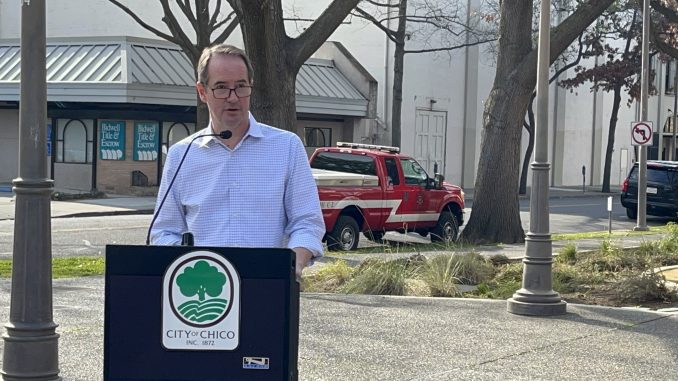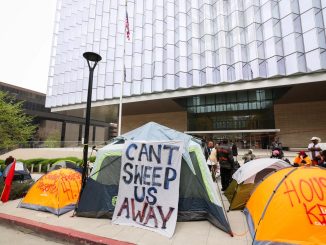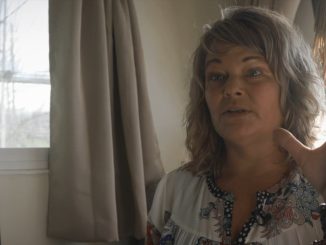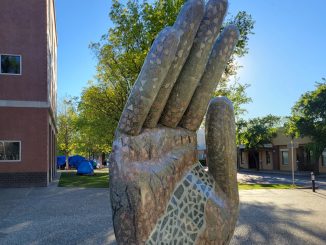
Chico’s mayor and city manager held a press conference Tuesday (Jan. 18) regarding last week’s settlement of the Warren v. City of Chico lawsuit, breaking months of court-ordered confidentiality that barred players on both sides of the case from speaking publicly about the case during negotiations.
City Manager Mark Orme stuck mostly to the details of the settlement and city staff’s plans to follow through on its directions, while Mayor Andrew Coolidge’s comments were more broad. Coolidge said Magistrate Judge Kendall J. Newman, who oversaw the settlement negotiations, personally told him via phone that he’d “fine or imprison you” for speaking out during the case, and that he was happy to speak out now that he’s legally allowed.
In addition to offering a brief history of the lawsuit and his view of the settlement, Coolidge vilified the plaintiff’s counsel and refuted claims that council members weren’t presented the full details of the agreement, particularly regarding new rules the city must follow when enforcing its anti-camping ordinances.
A necessary compromise
Coolidge kicked off his address with a generally positive appraisal of the settlement: “I do believe it creates a clear path forward, not only for enforcement, but for compassion for those who don’t have homes in our community.” However, this did not stop him from criticizing the process, parties on the other side of the court case and the overall outcome.
“It’s important to realize this is a path forward that covers both bases,” he said. That’s why we don’t all like it, that’s why I don’t all like it. I think it’s a fair compromise. I’m not thrilled with all aspects and I doubt you can find anyone who is.”
Among his criticisms of the negotiations process was a lack of direction from federal Judge Morrison England Jr. on how to avoid permanent injunction. He said this led the city to build the failed airport resting site last summer in the hopes the court would find it sufficient to address a lack of available shelter beds upon which the case was partly based.
“Not providing a clear path forward to allow us to know what we needed to do is the wrong way to run justice in this country,” Coolidge said. “We took a chance knowing [the airport site] wasn’t perfect, knowing it was the bare minimum, and the judge rejected it … outright criticized it, in fact.”
Regarding the necessity of the settlement, Coolidge said the alternatives were to fight the case all the way to the United States Supreme Court or face a permanent injunction.
“The route of a permanent injunction, the route of the Supreme Court … [would entail] two, three, four, five years more of dealing with this issue. I don’t think Chico could handle it. I don’t think our parks and waterways could handle it. I don’t think our community could handle it.”
Coolidge said that while the new rules for enforcement make it more difficult, he is confident that the city will soon be able to shut down and “clean up” homeless encampments that continue to spring up all over town.
Though he didn’t specifically name the individuals or organizations he was referring to, Coolidge offered a harsh appraisal of Legal Services of Northern California (LSNC), the firm that, along with aid from the Western Center on Law & Poverty, represented the eight homeless plaintiffs in the case.
“Unfortunately we had attorneys, not out for their clients but out for their own pocketbook, approach the city of Chico and enter us in this lawsuit,” he said. “Let’s be very clear, these attorneys will move on to another city and do the same thing, they are out for their own gain.”
Interviewed about the settlement earlier this week, Cory Turner of LSNC said his organization is entirely funded by grants and awarded legal fees, and that nobody at LSNC profited from the settlement.
Vice mayor’s challenge
In a last-minute letter to Judge Newman, Vice Mayor Kasey Reynolds claimed that during a Jan. 4 closed session—when the council voted unanimously to approve the settlement—members were presented a verbal review of the settlement, with certain issues lingering and left for City Attorney Vince Ewing to work out. She said she assumed a document with all of the details would be coming back to council after those details were settled.
Reynolds wrote on Jan. 14: “There were absolutely NO conversations about enforcement and what/how it would look in the agreement. We were advised that once this agreement was reached the injunction would be lifted and we would again be able to uphold our Chico Municipal Codes. In reviewing this agreement, I just as a lay person can find over a handful of areas where it appears to me we will be leaving our city in a position of actually NOT being able to do the stated goals of providing safe resting areas and enforcing laws equally in our community while protecting our parks and waterways.”
Reynolds claims she was unable to view the final settlement document until Jan. 13, expressed concern that she’s on record voting yes to accept it, and asked the judge to let the council vote again at its Jan. 18 meeting.
Despite the councilwoman’s plea, the judge signed the order that same day Reynolds’ letter was entered into the case docket.
Coolidge didn’t name the vice mayor during his press conference address, but did speak to the issue of the council members’ process in approving the settlement.
“I think it’s very important to know that the council had every single aspect of this agreement explained to us,” he said. “We knew coming out of closed session not only what was in the agreement, but every detail of it, and when I read it with all its legalese, it said exactly what we were told.
“So, if other counselors didn’t see that or understand that or ask the questions that they should have asked to completely understand that, then the onus is on them. We went around the room, I asked each counselor if they wanted to ask any further questions before we voted, and we voted in I would dare say historic fashion, 7-0, to move forward on what I see as not only compassionate solutions but also a path to enforcement of our parks and waterways.”
Reynolds also called for public employee performance evaluations for Orme and Ewing to be held during closed session after the council meeting last night (Jan. 18). Direction was given to staff during the meeting, but no action was action taken.
Moving forward
Orme’s segment of the press conference was fairly succinct, and offered just a few more details than have previously been provided about how the city will comply with the settlement.
“The outcome of the settlement creates a path for allowing the city to be able to enforce laws that were restricted from being enforced for over nine months, which created a disastrous and extremely difficult reality for our city,” he said. Orme said the path back to enforcement is reliant on the city “creating a well-managed shelter site” and “going through a process-heavy engagement effort with populations living within public spaces.”
Orme focused on the non-congregate housing site to be located at 2352 Martin Luther King Jr. Parkway, which will include 177 pallet shelters with a total of 354 beds. Butte County’s Departments of Behavioral Health and Employment and Social Services will have facilities on-site and caseworkers for residents will be available.
Orme thanked Butte County for financial and other support. He noted the majority of funds used so far to comply with the settlement’s orders are grants, and that he’s confident the city and county will continue to find similar funding to build out the site and for ongoing operations.
“This is a legal path to get help to those individuals willing to accept it and to bring back cleanliness and safety to our public spaces,” Orme said of the settlement. “[It’s a] doubly beneficial effort, no matter how complex.”




“enforcing laws equally in our community…” Didn’t bother the councilor when O’Brien was appointed to the Council despite failing to meet the deadline for his 700 filing with the FPPC , Why now? You don’t reply to emails about this failure. When did this Council become concerned about fair play? . The Mayor refuses to reply to factual emails also. The Homeless at least got representation while citizens can’t even get reply’s. So sad that you waited to the last minute and were properly rewarded. As for the Mayor ..O’Brien’s there to supply leadership and your district doesn’t need two representative’s One of you should step down.. . Maybe both of you.